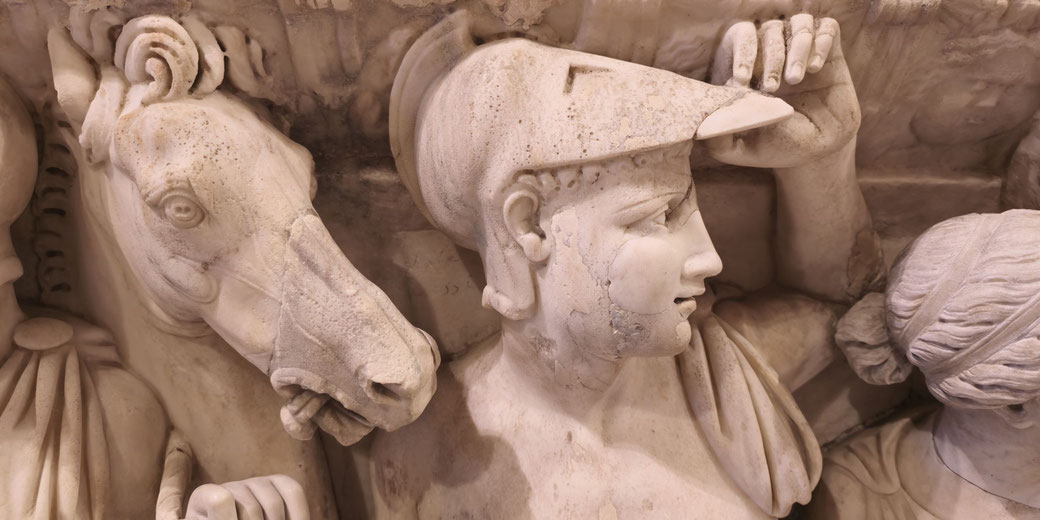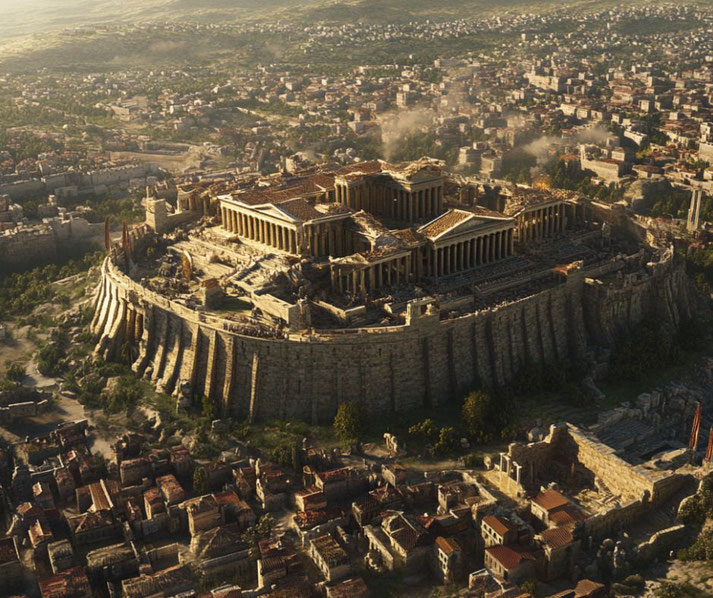Thucydides: The humiliated Athenian general who became one of the greatest ancient historians

A general turned historian, Thucydides lived through one of the most destructive conflicts in Greek history—the Peloponnesian War.
However, it was a failure to defend the city of Amphipolis that led to his exile, but this bitter setback became the turning point that allowed him to write his monumental work.
From a distance, Thucydides was able to observe the war’s devastation and analyze the forces that shaped it. In contrast to his predecessors, he was one of the first to systematically dismiss divine influence and focused solely on human actions and motivations.
As a result, Thucydides’ life work was a relentless pursuit of truth, which set his writing apart as a groundbreaking approach to recording history.
Who was Thucydides?
Thucydides was born into a family of wealth and status in the Athenian deme of Halimous, a coastal area not far from the heart of the city.
His father, Olorus, came from a line of Thracian nobility, which linked Thucydides to the influential elites of both Athens and the northern regions of the Aegean.
In particular, his family held extensive property, including valuable mines in Thrace, a region where economic power often translated into political influence.
Athens in Thucydides' youth thrived under the leadership of Pericles, who encouraged an era of remarkable artistic, cultural, and intellectual growth.
Thucydides' natural curiosity thrived in this environment, as it placed him in direct contact with the philosophers and orators.
He likely studied under men like Anaxagoras, whose teachings on reason over superstition may have influenced his later work and planted the seeds of his rational and evidence-based approach to history.
As a young man, Thucydides also saw Athens’ expansionist ambitions up close. At the time, the city’s dominance in the Delian League gave its citizens a sense of superiority.
His family’s ties to Thrace gave him firsthand knowledge of strategic regions essential to Athenian imperial interests.

Thucydides' military career in the Peloponnesian War
Thucydides rose to prominence as a general during the Peloponnesian War, which was a conflict that engulfed the Greek world from 431 to 404 BC.
In 424 BC, he held command over the Athenian fleet in the northern Aegean, tasked with defending the crucial city of Amphipolis.
This city was located near the Strymon River and was vital for Athenian control over trade routes and resources, particularly those related to the mines in Thrace.
His military responsibilities required swift and decisive action, especially with Spartan forces under Brasidas threatening Athenian control in the region.
However, his efforts to protect the city fell short when he arrived too late to prevent the city's capture by Brasidas after a short assault.
The loss of the city was a severe blow to Athens, which relied heavily on its control over the northern Aegean and Thrace for resources.
The Athenian assembly, known for punishing generals who did not meet its high expectations, swiftly exiled Thucydides in 424 BC, viewing his inability to defend the city as a serious breach of duty.
He likely became a scapegoat for a defeat that likely had deeper causes beyond his control.
Although, this forced removal from public life left him with no choice but to abandon his military ambitions.
His exile lasted twenty years, during which time, cut off from his homeland, he found himself traveling through various parts of the Greek world, including Sparta and the Peloponnesian territories.
This freedom from the confines of Athenian political life gave him unique access to both sides of the war.
He could now observe events with a more critical eye, free from the biases and pressures of public office.
His time away from the immediate pressures of political and military life enabled him to reflect deeply on the nature of war, leadership, and the fragile alliances that shaped the struggle between Athens and Sparta.
However, Thucydides' experiences as a military leader shaped his understanding of strategy and power.
He had seen firsthand the consequences of poor leadership, as well as the unpredictable nature of warfare, where even the most carefully laid plans could unravel.
His personal involvement in the war, both as a participant and observer, gave his historical writings a sharpness and realism that set them apart from other accounts of the time.
His failures and insights into human behavior during moments of crisis would become the foundation of his historical analysis.
The Peloponnesian War: Thucydides' masterpiece
As a result, Thucydides' History of the Peloponnesian War is one of the most detailed and analytical accounts of war in ancient history.
The work, which is composed of eight books, spans over two decades of conflict between Athens and Sparta, from 431 to 404 BC.
Thucydides sought to record events with precision, presenting the war in a clear and logical manner.
He divided his history chronologically, focusing on the most significant events and battles, such as the siege of Plataea, the plague of Athens, and the disastrous Sicilian Expedition.
His careful attention to detail set his work apart from previous historical accounts, and he relied on eyewitness testimony and his own experiences to verify his narrative.
Throughout his history, Thucydides maintained a focus on human motivations and the underlying causes of conflict.
He rejected the idea that the gods played a role in shaping the war’s outcome, instead attributing events to human decision-making and the harsh realities of power.
He explored the rivalry between Athens and Sparta, the rise of imperialism, and the internal struggles within each city-state.
Thucydides made it clear that the conflict arose not only from specific grievances but from the broader competition for dominance in the Greek world.
His analysis of events such as the Melian Dialogue, where Athens coldly demanded submission from a neutral island, even offered insight into the darker sides of political power.
He alternated between descriptions of military campaigns and speeches delivered by key figures, such as Pericles, Cleon, and Alcibiades.
These speeches were not word-for-word records of what was said but rather crafted representations of the arguments and ideas circulating at the time.
For instance, Pericles' Funeral Oration in Book 2 celebrated Athenian democracy and the city's resilience, while the debate over the fate of Mytilene in Book 3 revealed the brutal decisions that war imposed on its participants.
As a result, Thucydides often used these speeches to reveal the moral and philosophical dilemmas of the war.
Furthermore, Thucydides also provided a stark account of human suffering, particularly during moments of crisis.
His vivid description of the plague that struck Athens in 430 BC painted a grim picture of chaos and despair.
He recorded that nearly one-third of the city’s population perished, including Pericles, Athens’ greatest leader.
This catastrophe weakened Athens both militarily and morally, highlighting the unpredictable nature of war.
As is clear, Thucydides chronicled not just the victories and defeats of the Peloponnesian War, but the toll it took on individuals and societies.
However, the final book of Thucydides' history ended abruptly, leaving the reader without a conclusion to the war.
This is because Thucydides did not live to see the ultimate defeat of Athens in 404 BC.
The exact details of Thucydides' death remain uncertain, but it is generally believed that he died around 400 BC, though some sources suggest it may have been slightly earlier.
Thucydides likely died in Athens or in one of his properties in Thrace, since, after his twenty-year exile, he had returned to Athens following the fall of the city to Sparta in 404 BC.
His return would have allowed him to gather more information for his history, but there is no record of his activities in the final years of his life.
Although some ancient writers, such as Plutarch, speculated that Thucydides was murdered, these accounts have never been verified.
Realism in Thucydides' writing
Thucydides viewed human nature as driven by fear, self-interest, and the pursuit of power.
His historical narrative consistently reflected these ideas, which he saw as universal truths that shaped human behavior in both peace and war.
Thucydides believed that human actions were predictable and often motivated by self-preservation, a principle that explained much of the conflict he described.
In the Melian Dialogue, for example, the Athenians bluntly state that "the strong do what they can, and the weak suffer what they must," a statement that encapsulated Thucydides' realist philosophy.
He showed how the Athenians’ pursuit of power led them to disregard moral considerations in favor of practical outcomes, which they believed would secure their dominance.
Power, for Thucydides, was a force that determined the fate of cities and individuals alike.
He saw it as something that rulers constantly sought, often at the expense of justice or fairness.
His history illustrated how both Athens and Sparta struggled for supremacy, driven by their desire to maintain or expand their influence over the Greek world.
Thucydides argued that the quest for power was not just a feature of war but an inherent part of politics.
In his account of the Corcyraean civil war, he showed how power struggles within a single city could mirror the larger conflict between states.
The internal strife in Corcyra revealed how factions, motivated by greed and fear, could descend into brutal violence when the balance of power shifted.
Thucydides viewed politics as a realm where ethical considerations frequently gave way to the demands of survival.
This view was especially evident in his depiction of Athenian democracy, where leaders like Pericles recognized that maintaining power required difficult, sometimes ruthless decisions.
Thucydides admired Pericles for his pragmatic leadership, which was based on a clear understanding of what was needed to preserve Athenian dominance.
Yet, he also noted how the political environment in Athens became unstable after Pericles' death, as leaders who followed him lacked the same foresight and allowed personal ambition to cloud their judgment.
Thucydides believed that conflict arose when states or individuals pursued their interests without restraint, leading to clashes over resources, influence, and security.
His detailed accounts of battles and negotiations revealed how war shaped the course of history, often in ways that leaders could not foresee or control.
Thucydides did not glorify war; instead, he presented it as a harsh reality that exposed the limits of human ambition.
His history showed that while power could bring temporary success, it also carried the seeds of destruction, as seen in Athens’ disastrous Sicilian Expedition.
What do you need help with?
Download ready-to-use digital learning resources
Copyright © History Skills 2014-2025.
Contact via email
With the exception of links to external sites, some historical sources and extracts from specific publications, all content on this website is copyrighted by History Skills. This content may not be copied, republished or redistributed without written permission from the website creator. Please use the Contact page to obtain relevant permission.





